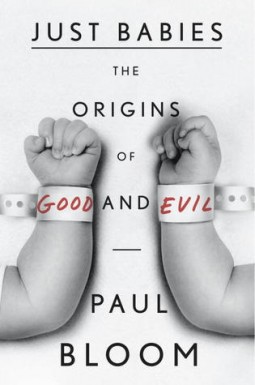This review contains affiliate links, which earn me a small commission when you click and purchase, at no extra cost to you. Thank you for supporting my small business and allowing me to continue providing you a reliable resource for clean book ratings.
We all wonder just when morality, a sense of what’s generally right and wrong, begins in human beings. Do we “come” with it? Do we learn it from our parents or from other interactions? Paul Bloom tries to address these basic questions by starting as early as possible, with babies.
Believe it or not, psychologists have actually created studies that examine these issues in babies, not newborns, mind you, but still under the age of 1. Other studies involve toddlers and young school-age children. It’s amazing just how much can be figured out about what’s in the minds of babies and little children with carefully crafted experiments and close observation. Bloom walks readers through the basic reasoning of each study example and how conclusions were drawn.
Just Babies examines how humans seem to develop or exhibit ethics/morality in several areas: “empathy and compassion,” “fairness, status, and punishment,” “family” and “others,” and how we view “bodies.” The book looks at basic ideas of right and wrong in different cultures (how these notions are alike and sometimes very different) and in the views of both psychologists and philosophers, and it includes samplings of psychological studies as well as explanations of ideas from these various “experts.” The book is pretty approachable for the lay reader who has little experience in these areas, and it’s fairly easy to read and understand.
I found it interesting overall and mostly what I was expecting, though I still thought it didn’t quite answer the posited idea of “the origins of good and evil.” Even so, I found some of the studies and ideas discussed fascinating.
Rated: Moderate, just for one use of strong language in a quote and a couple of other uses of milder language, as well as a few brief allusions to topics of sexuality. (I had to wonder, though, why in the world it was necessary to use that particular quote with the f-word; it would have been just fine leaving it out, and the book would then be pretty much completely clean.)
Click here to purchase your copy of Just Babies on Amazon.




